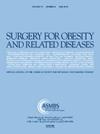Bariatric surgery and COVID-19 outcomes: results from the PaTH to Health: Diabetes study
IF 3.8
3区 医学
Q1 SURGERY
引用次数: 0
Abstract
Background
Obesity and type 2 diabetes mellitus (T2DM) are risk factors for severe COVID-19 infection. Bariatric surgery (BSG) is an effective treatment of obesity through weight loss and may reduce COVID-19 severity.
Objectives
We examined the effect of BSG on COVID-19 outcomes in patients with or at risk of T2DM.
Setting
Electronic health record data from the PaTH Clinical Data Research Network, a partnership of 5 health systems reviewed from March 1, 2020, to December 31, 2020.
Methods
Ambulatory and in-hospital patient encounters with COVID-19 diagnosis and obesity were identified. We constructed 2 patient groups: BSG and non-BSG (NBSG). The BSG group included patients with at least 1 encounter for the BSG procedure code and/or 1 BSG diagnosis code; the NBSG group included patients with no procedure or diagnosis code for BSG with body mass index (BMI) ≥40 or BMI ≥35 and at least 2 obesity-related co-morbidities. We matched 1 patient in the BSG group to 2 patients in the NBSG group based on age, gender (sex defined at birth), race and ethnicity, group (T2DM and at risk of T2DM), and site. The primary outcome was 30-day outcomes of COVID-19 severity.
Results
After matching, we found that patients with BSG had lower odds of respiratory failure (41%) and ventilation/intensive care unit (ICU) admission/death (52%). Patients in the BSG group had lower odds of hospitalization, pneumonia, respiratory failure, and the most severe COVID-19 outcomes combined (ventilation/ICU admission/death). T2DM was identified as a risk factor for COVID-19 severity in the BSG group.
Conclusions
This retrospective, matched-cohort analysis found BSG to have a protective effect against severe COVID-19 outcomes.
减肥手术和 COVID-19 结果:从PaTH到健康糖尿病研究的结果
背景肥胖和2型糖尿病(T2DM)是严重COVID-19感染的危险因素。我们研究了BSG对T2DM患者或有T2DM风险的患者COVID-19治疗效果的影响。方法确定了COVID-19诊断和肥胖的非住院和住院患者。我们构建了两个患者组:BSG组和非BSG组(NBSG)。BSG 组包括至少有 1 次 BSG 手术代码和/或 1 次 BSG 诊断代码的患者;NBSG 组包括没有 BSG 手术代码或诊断代码、体重指数 (BMI) ≥40 或 BMI ≥35 且至少有 2 种肥胖相关并发症的患者。我们根据年龄、性别(出生时的性别定义)、种族和民族、组别(T2DM 和有 T2DM 风险的组别)和地点,将 BSG 组的 1 名患者与 NBSG 组的 2 名患者配对。结果匹配后,我们发现 BSG 患者呼吸衰竭(41%)和通气/重症监护室(ICU)入院/死亡(52%)的几率较低。BSG组患者的住院率、肺炎率、呼吸衰竭率以及最严重的COVID-19结果(通气/入住重症监护室/死亡)均较低。在 BSG 组中,T2DM 被确定为 COVID-19 严重程度的一个风险因素。结论这项回顾性配对队列分析发现,BSG 对严重的 COVID-19 结果具有保护作用。
本文章由计算机程序翻译,如有差异,请以英文原文为准。
求助全文
约1分钟内获得全文
求助全文
来源期刊
CiteScore
6.70
自引率
12.90%
发文量
570
审稿时长
56 days
期刊介绍:
Surgery for Obesity and Related Diseases (SOARD), The Official Journal of the American Society for Metabolic and Bariatric Surgery (ASMBS) and the Brazilian Society for Bariatric Surgery, is an international journal devoted to the publication of peer-reviewed manuscripts of the highest quality with objective data regarding techniques for the treatment of severe obesity. Articles document the effects of surgically induced weight loss on obesity physiological, psychiatric and social co-morbidities.

 求助内容:
求助内容: 应助结果提醒方式:
应助结果提醒方式:


